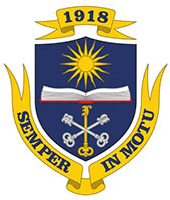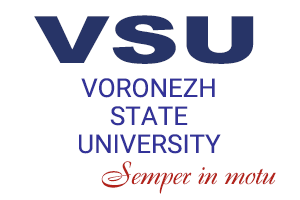A VSU graduate tells his story of success
Graduates of Voronezh State University tell the university's entrants about their life, how they built their career after graduation and how the university helped them in it. This time Kirill Bakhtin, a graduate of the Department of Economic Analysis and Audit of the Faculty of Economics, a graduate of a master's degree programme of New Economic School (NES, 2009), and a CFA Сharterholder, PhD in Economics, told his story of success.
I am proud to have studied at Voronezh State University
Voronezh State University has a great history and deserves to be proud of its achievements. Among its graduates are many successful specialists and prominent scientists. There are a large number of faculties, departments, and subjects to choose from, that provide a lot of opportunities for its students and a solid base for future success. The university curriculum is diverse and the academic staff show students how to seek complex solutions. VSU sees its objective not only in professional training, but also in providing social activities and developing students' personality. It has sports clubs, student societies, libraries, laboratories, computer classes and other facilities that help students to improve different skills and abilities. I would like to assure the applicants who are making their choice and those who take an interest in the university's life that VSU is indeed one of the leading universities. I had a chance to compare it with some other universities and from my own experience; I can say that VSU offers educational services of very high quality.
The beginning of my career
My career started in Voronezh when I was a third year student and had an internship in the Promsvyazbank. It should be noted that it was absolutely my idea to do the internship. Looking back, I can say that it was a very good decision: it made me understand what exactly I was interested in, provided a highly valuable experience in banking, and, of course, it was a way to improve my CV. I recommend students to plan their career when they study at university rather than after graduating. My next internship was in Moscow in the analytical unit of the Global investment bank Merrill Lynch. I can say that this internship influenced my future career a lot. By then, I had already been doing a master's degree programme of New Economic School (NES, 2009) for a year. Competition for this internship as well as for many other open internship vacancies placed by international companies was very strong. It involved several stages of testing and interviews that were very much similar to the ones for a permanent position. When applying for the internship I found my knowledge of accounting, economic analysis and audit that I obtained at VSU's Economic Department very helpful. Together with my internship experience it made me stand out. In my opinion, when choosing from university graduates normally an employer pays attention to a number of things: Firstly, the applicant's excellence in the fields and subjects they studied at university and secondly, their competitive advantages. For example, if the applicant has no experience in the job other achievements might be taken into account (i.e. social life, sport, music, etc.). Thirdly, motivation plays an important and sometimes the most important role. The employer judges it by reading the covering letter or during the interview – they take notice of how well the student is prepared for the interview, what kind of questions he/she asks and if he/she shows interest in the field and the company itself. I should say that excellence in English is a strong competitive advantage as it means that the applicant can read foreign papers in the field and communicate easily with international partners.
Studying at Hong Kong University of Science and Technology (HKUST)
In 2014–2015, Kirill Bakhtin studied on the MBA programme at Hong Kong University of Science and Technology (HKUST) – one of the world’s leading business schools.
I got a chance to study on the MBA programme as a result of a selection process common for business schools. The MBA programme is meant for people with a 5-10 year work experience. To apply for the programme you have to provide a package of documents that includes certificates, results of unified business school tests and examinations and references from top managers from previous jobs. What's more, the final stage involves interviews with the applicants. My MBA programme consisted of 5 modules. Each module had 7 academic weeks and one examination week. That means that you have to study almost every day. You have basic courses and electives. All lectures last 3.5 hours with two short breaks. Almost every week you have homework for each subject: 40% of it is individual and 60% is group work. Normally, you spend about 5-6 hours on it. Exams can be individual or for a group of people who present the results of their joint projects. The score for each subject is made up of the three components: commitment to lectures, homework and the final exam (or project). I decided to join the programme for several reasons. First of all, I understood that I need international experience. Multicultural communication is very important for personal development, networking with international partners, and building your career. Secondly, I believe that the MBA programme helps you to analyse the experience you have gained and reveals future opportunities. In other words, the MBA makes you think about what exactly you are interested in and what you want to achieve in the future. I do not think that an MBA is a way to take a break from work. I took it as an opportunity to see my strengths and weaknesses and improve them, to meet new, interesting and ambitious people as well as to get a lot of useful information.
Russian and international education
My experience allows me to fight against some preconceptions of sceptics. Firstly, the range of subjects at VSU and the themes discussed within the subjects comply with the international standards. Students get as much information as in any international university. And it is up to a student how much time to spend on self-education. I do agree, that due to a number of reasons Russian students are not as fluent in English as their European counterparts. However, education and knowledge are not determined by the language medium. Secondly, technologies that support educational activity and provide information can only make the process of studying a bit easier. They mainly provide an easier and simpler way of interaction with university and cannot completely replace the process of studying. I know that, today Voronezh State University is very dedicated to introducing advanced technologies. Students of all international universities have ideas about how their universities can improve. And these ideas can only be put into action if universities and graduates cooperate.
What advice would you like to give to the university's entrants, students and graduates who have not succeeded in their career yet?
I believe that the most important thing at any stage is to set a goal or a dream and try to reach it. As for the career choice, I think the university's graduates should understand the following things: firstly, they have to be interested in the field they have chosen, the graduate has to dream of being able to contribute to it; secondly, he/she must be sure that they have the necessary qualities, or that they wish to acquire them, to become the best in their field. And of course you should keep in mind the financial aspect.










